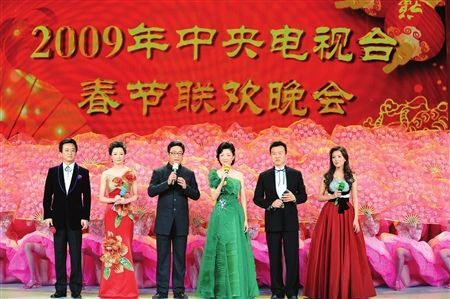 |
|
Anchormen and anchorwomen host the Spring Festival Gala during a dress rehearsal in China's biggest TV station, CCTV, in Beijing, capital of China, Jan. 13, 2009. [Xinhua]
|
"Only two days away," Wang Yin says to himself, checking the calendar. It's been a tradition for Wang and his parents to gather around the TV set at exactly 8pm and watch the lavish TV gala on Chinese New Year's Eve. Four-plus hours of boob tube glitz, chitchat and snacks.
Watching China Central Television's (CCTV) Lunar New Year's Eve Gala has been a tradition for almost all Chinese people.
Though many now feel disappointed in its predictable, scripted programs, it's the premier TV entertainment that night.
But there are others:
A shanzhai (knock-off) CCTV gala will actually be an online parody of the official show. This is a grassroots first.
It's supposed to be casual, a bit irreverent, funny and set to appeal to ordinary folks. The acts will include singing migrant workers.
Then there's a Dragon TV gala featuring local celebrities, regional TV programs and a Channel Young cooking show from noon to 8pm - all about traditional Lunar New Year's dishes.
Every year the CCTV extravaganza is viewed by an estimated 1 billion people at home and abroad, making it one of the world's most-watched shows.
It is broadcast live nationwide and worldwide by CCTV through its Chinese-language channels, its English, French and Spanish services and its Website.
The gala debuted in 1983. Without professional gala hosts at the time, popular actress Liu Xiaoqing and cross-talk performers Ma Ji and Jiang Kun were invited to MC the show.
Nowadays, however, it's difficult for organizers to put on a very special program that appeals to all tastes.
There's always singing and dancing, acrobatic shows and mini comedy dramas.
Singers this year include Hong Kong pop icon Nicholas Tse and Taiwanese singer Jay Chou, combining folk charm with modern elements.
In other countries, the Lunar New Year and Solar New Year are celebrated with traditional programs.
In Japan, NHK annually broadcasts the famous Red and White Singing Contest on December 31. The female artistes in the Red group and males in the White group face off. The latest edition raked in 42.1 percent in ratings, the highest in three years.
Fan Wei, one of the top comedians in China, rose to fame through his acts on the CCTV gala show.
Many actors like Fan, however, now hope to shift to other platforms like TV series and film. They say they have been under enormous pressure to entertain such a huge audience.
"You can't imagine how hard it is for us to contend with high expectations from the audience year after year," Fan says. "Before the show really started, each program went through strict and time-consuming procedures for censorship and revision.
"Participation is both glorious and exhausting. The truth is that I would still be an anonymous TV host but for the gala."
For him, the gala is an indispensable custom, just like dumplings to northern Chinese people during the Spring Festival.
"In fact, after more than two decades' development, the gala is now more than a TV show. It is about family gathering and has already become part of the new year celebrations," says Fan.
Before the mid-1990s, the gala show did garner wide acclaim when people had fewer entertainment options and were less sophisticated.